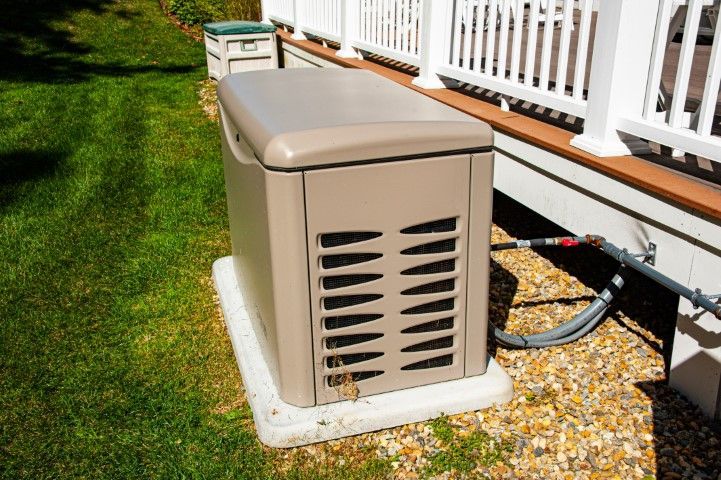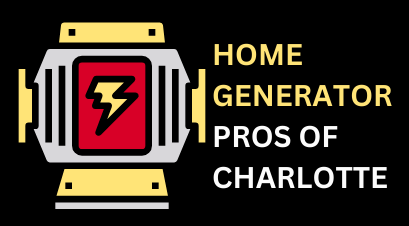Residential Generators in Charlotte NC
A residential generator is a device designed to supply power to your home in the event of an electrical outage. Unlike portable generators, which can be moved from one location to another, residential generators are typically installed permanently at your home. They kick in automatically when the power goes out, ensuring that your essential appliances, like refrigerators, lights, and heating systems, continue to operate without interruption.
Types of Residential Generators
There are several types of residential generators, each suited to different needs and preferences:
- Standby Generators: These are the most common type for residential use. They are permanently installed outside your home and connect directly to your electrical system. They automatically start up when the power goes out, usually within seconds, and can run on propane, natural gas, or diesel.
- Portable Generators: As the name suggests, these generators are movable. They are typically used for short-term power needs and are ideal for outdoor activities or emergency situations. They require manual setup and are often powered by gasoline.
- Inverter Generators: These are a subtype of portable generators that produce cleaner power and run more quietly than standard portable generators. They are suitable for sensitive electronics and are often used in smaller residential setups.
Cost Factors
The cost of a residential generator can vary widely based on several factors:
- Generator Type: Standby generators generally cost more than portable generators due to their size and installation requirements.
- Power Output: Generators come in various sizes, and the larger the unit, the more it will cost. The power output you need will depend on the size of your home and the number of appliances you want to keep running during an outage.
- Fuel Type: Generators can run on different fuels such as gasoline, propane, or natural gas. Each fuel type has its own cost implications. For example, natural gas is often cheaper but may require additional setup.
- Installation: Professional installation is crucial for standby generators and can add to the overall cost. Proper installation ensures that the generator operates safely and efficiently.
Safety Tips
When using or installing a residential generator, safety is paramount. Here are some tips to keep in mind:
- Proper Ventilation: Generators produce exhaust gases that can be harmful if not properly vented. Ensure your generator is placed in a well-ventilated area away from windows, doors, and vents.
- Avoid Carbon Monoxide Poisoning: Never operate a generator indoors or in an enclosed space. Carbon monoxide from the exhaust is dangerous and can be fatal.
- Use a Transfer Switch: For standby generators, a transfer switch is essential. It safely connects the generator to your home’s electrical system and prevents backfeeding, which can be dangerous for utility workers and your generator.
- Regular Inspections: Have your generator inspected regularly to ensure it is in good working condition and ready for use in an emergency.

Professional Installation
Professional installation is crucial for ensuring your generator works correctly and safely. A licensed electrician or a professional generator installer will:
- Assess Your Needs: Determine the appropriate size and type of generator for your home.
- Install the Generator: Properly install the unit, including the transfer switch and any necessary wiring.
- Test the System: Ensure the generator starts and operates as expected.
- Provide Maintenance Instructions: Offer guidance on how to maintain your generator and what to do in case of issues.
Routine Maintenance and Servicing
Routine maintenance is essential to keep your generator running smoothly. Regular servicing includes:
- Oil Changes: Change the oil according to the manufacturer’s recommendations to keep the engine running efficiently.
- Filter Replacements: Replace air and fuel filters as needed to ensure clean operation.
- Battery Checks: Inspect and replace the battery periodically to prevent starting issues.
- General Inspection: Check for any signs of wear or damage and address them promptly.
Common Myths and Misconceptions
Several myths surround residential generators. Here are a few to clear up:
- Myth: Generators Are Too Noisy: While older models could be noisy, modern generators are designed to operate quietly, especially inverter types.
- Myth: Generators Are Too Expensive: While the upfront cost can be high, generators can be a cost-effective solution in the long run by preventing the spoilage of food and the inconvenience of power outages.
- Myth: Portable Generators Are as Good as Standby Generators: Portable generators are less powerful and require manual setup. Standby generators offer automatic operation and are more reliable for continuous power during outages.
If you’re considering installing a residential generator in Charlotte, NC, or need service for an existing unit, we’re here to help. Our team of experts will guide you through the selection process, handle the installation, and provide ongoing support to ensure your home stays powered when you need it most.
Get in touch with us today to learn more about how we can assist you in securing a reliable power source for your home.
Why Every Home Needs a Generator for Backup Power
Power outages can disrupt daily life, from spoiling food in the refrigerator to interrupting work or entertainment. Whether caused by severe weather, technical failures, or unforeseen accidents, losing electricity can be inconvenient and stressful. This is where a residential generator becomes a valuable asset. In this post, we'll explore why having a backup generator is essential for homeowners and how it can provide peace of mind during unexpected power interruptions.
Increases Property Value
Installing a residential generator can also increase the value of your property. Homebuyers are often attracted to properties with backup power solutions, as they provide a sense of security and reliability. If you ever decide to sell your home, having a generator installed can be a selling point that sets your property apart from others on the market.
Ensures Uninterrupted Power Supply
When the electricity goes out, a generator kicks in automatically, so you don't have to worry about manually starting it. This continuous power flow keeps your home running smoothly, ensuring that your appliances, lights, and other essential devices remain operational. This is especially critical for those who rely on medical equipment that requires constant power.
Enhances Home Security
During a power outage, security systems, including alarms and cameras, might fail if not backed up by a generator. This lapse in security could leave your home vulnerable to break-ins or other security issues. A generator ensures that your security systems remain active, protecting your home and giving you peace of mind, even when the electricity is out.
Increases Comfort and Convenience
A generator enhances your overall comfort and convenience. Imagine a summer power outage with no air conditioning or a winter outage without heat. These situations can be uncomfortable and even hazardous. A generator allows you to maintain a comfortable indoor climate regardless of the weather outside. It also enables you to continue using essential household appliances, such as your oven, washing machine, and entertainment systems, making life easier during an outage.
Provides Peace of Mind
Knowing that you have a reliable backup power source offers tremendous peace of mind. You won't have to worry about the potential impact of an outage or scramble to find alternative solutions. With a residential generator, you can rest assured that your home will remain functional and secure, no matter what happens. This peace of mind is invaluable, especially for families and individuals who want to avoid the stress and inconvenience of power interruptions.
Protects Your Home and Property
A power outage can lead to various problems, such as frozen pipes, spoiled food, and security issues. For instance, if the power goes out in winter, your heating system may stop working, leading to potentially frozen pipes that could burst and cause water damage. Similarly, a refrigerator or freezer without power can spoil food, leading to wastage and potential health risks. A residential generator helps mitigate these risks by keeping your systems operational and your home safe from damage.
If you want to ensure your home is always prepared for unexpected power outages, consider installing a residential generator. Our team of experts can help you choose the right generator for your needs and handle the installation process with precision and care. Contact us today to learn more about how a residential generator can enhance your home’s safety, comfort, and value. Let us help you stay prepared and enjoy uninterrupted power no matter what the situation may be.
Important Safety Measures for Operating Residential Generators
Proper Placement
Position your generator outdoors and away from windows, doors, and vents. Generators produce exhaust gases, including carbon monoxide, which can be deadly if allowed to accumulate in enclosed spaces. Ideally, place the generator at least 20 feet away from your home and any structures.
Ventilation
Ensure your generator is in a well-ventilated area. Good airflow is necessary to disperse the exhaust fumes and prevent them from entering your home. Never use a generator inside your garage or any enclosed space, even if the garage door is open.
Fuel Handling
Store fuel for your generator in approved containers and away from living areas. Keep the fuel in a cool, dry place, and never refuel a running or hot generator. Fuel spills can lead to fires or explosions, so handle fuel with care.
Electrical Safety
Use heavy-duty, outdoor-rated extension cords to connect your generator to appliances. Ensure the cords are in good condition and rated for the power they will carry. Avoid overloading the generator, and do not plug it directly into your home’s electrical system without a proper transfer switch, as this can create a risk of electrical shock or fire.
Regular Maintenance
Perform regular maintenance on your generator to ensure it functions properly. Follow the manufacturer's guidelines for oil changes, filter replacements, and overall servicing. A well-maintained generator is less likely to experience problems or pose safety hazards.
Operation Procedures
Read and follow the manufacturer’s instructions for operating your generator. Never attempt to use a generator that appears damaged or has not been serviced according to the manual. Proper operation and adherence to guidelines help prevent malfunctions and accidents.
Carbon Monoxide Detectors
Install carbon monoxide detectors in your home, especially near sleeping areas. These detectors will alert you if carbon monoxide levels become dangerous, providing an extra layer of safety for your family.
Emergency Preparedness
Familiarize yourself with emergency procedures in case of a generator-related accident. Keep a fire extinguisher nearby and know how to shut down the generator quickly if needed. Being prepared can help you handle any issues that arise promptly and safely.
Generators are valuable tools for providing power during outages or in areas without reliable electricity. However, with their benefits come certain risks. Using a residential generator safely is crucial to avoid accidents and ensure it operates efficiently. This guide will cover essential safety tips to help you use your generator safely and effectively.

Safety is the top priority when using a residential generator. By following these tips, you can ensure your generator operates safely and effectively, providing peace of mind during power outages. If you have any questions or need further assistance with generator safety, feel free to contact us. Our team is here to help with all your generator-related needs.
